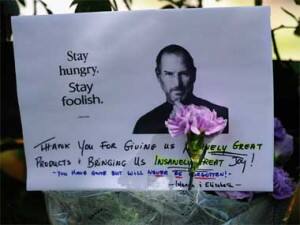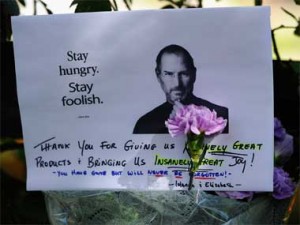Two leaders from the open-source, free software movement have stirred controversy with comments critical of Apple co-founder Steve Jobs. Richard Stallman, the founder of the Free Software Foundation, has never minced his words and often speaks as if free software is a fight between the forces of good and evil, an almost religious battle. The Free Software Foundation had several high-profile campaigns not just against
Apple and its products
but also Microsoft’s Windows. [caption id=“attachment_102316” align=“alignleft” width=“300” caption=“Kevork Djansezian/Getty Images”]
 [/caption] He
wrote on his personal blog
:
[/caption] He
wrote on his personal blog
:
“Steve Jobs, the pioneer of the computer as a jail made cool, designed to sever fools from their freedom, has died. As Chicago Mayor Harold Washington said of the corrupt former Mayor Daley, “I’m not glad he’s dead, but I’m glad he’s gone.” Nobody deserves to have to die - not Jobs, not Mr. Bill, not even people guilty of bigger evils than theirs. But we all deserve the end of Jobs’ malign influence on people’s computing.”
Hurting his cause Stallman’s comments were roundly condemned in technology circles, even by supporters of the free software. At ReadWriteWeb, Joe Brockmeier wrote :
“I see no argument whatsoever here to persuade Jobs’ fans that they should be considering free software. Just a petty expression of relief that a rival is no longer available to compete with Stallman’s cause.”
Steven J. Vaughan-Nichols, writing on a blog about Linux and open-source software on ZDNet, said:
“By choosing to use the occasion of Jobs’ death for one more public jab at proprietary software, Stallman did neither his personal causes nor the larger ones of free and open-source software any good.”
One prominent free software supporter, Larry Cafiero, believes that it is time to ‘fork’ or split the Free Software Foundation due to Stallman’s negative influence :
“the fact remains that Stallman’s dogmatic attitude and peculiar behavior has been an anchor weighing down a significant degree of progress the free software movement could have made to date.”
A pretty prison? Stallman wasn’t the only free software advocate to criticise Jobs. Eric Raymond, who wrote the influential essay on open-source software The Cathedral and The Bazaar , echoed Stallman’s comments, albeit with a slightly softer tone. Raymond said :
“What’s really troubling is that Jobs made the walled garden seem cool. He created a huge following that is not merely resigned to having their choices limited, but willing to praise the prison bars because they have pretty window treatments.”
Impact Shorts
More ShortsThis has been a common criticism of Apple and of Jobs that they their products were a triumph of form over function, technically inferior products that people bought because they looked better not because they worked better. The comments by Raymond and Stallman kicked off a discussion around the world. In Google Plus, Norwegian designer Daniel Jackson said that good design was much more than “window treatments”:
“Design is essential to humans, because design is about emotions. Not merely the lack of frustration that comes from good usability, but the joy from something extraordinary and the feeling of belonging that comes from fitting in. It’s about charisma.”
Simple is hard Stallman and Raymond’s timing seems at the least insensitive, as many mourn Jobs’ recent death, but they also point to some deep divisions, and problems, within the free software movement. Jobs was instrumental in creating hardware that was stylish and, just as importantly, software and operating systems that were easy and intuitive. This is something that many feel that free software often lacks, making it difficult to gain mainstream acceptance. Indeed, Mark Shuttleworth said at EuroOSCON in 2006, “Pretty is a feature”. Although Shuttleworth was talking specifically about Ubuntu, his point that free software “needs to look and feel super-polished” and that its developers “need to accept some constraints, and think about human-computer interaction” could be applied to many free software projects, even five years after that keynote. I’m writing this on a MacBook Pro, but just because I use a Mac doesn’t mean I’m a fan boy. I also have a home server running Ubuntu Linux and my MacBook also can boot into Windows 7. When it comes to Stallman’s battle of good (free) software and evil (proprietary) software, I’m an agnostic. I think open-source software has been an amazingly positive development for technology and I’m a huge advocate. However, I don’t berate people for using Windows computers or an iPad, and I agree with Daniel Jackson: Design is important, especially in making the complex intuitive. That’s a real challenge and it was one that Steve Jobs focused on during most of his life. Stallman is a passionate advocate of freedom in software. However, good design and intuitive use would open up open-source to many more people. Instead of launching petty attacks on a man who has just died, open-source activists should realise that easy-to-use, intuitive software isn’t an insult, it should be their goal.
)